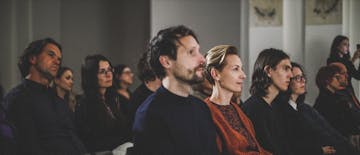The prospects of community: Between facts and values

Dr. Anja Hellmuth: Collective Memory, Culture of Remembrance and Early Societies
The concept of collective memory, going back on Maurice Halbwachs, can be understood in a broad sense as a collection of memories and knowledge of a specific social group whereby the memory itself is set up by individual social frameworks. Among these frameworks space, places and landscapes, time, communicative practices as rituals and festivities as well as objects play a significant role. As part of the collective memory is regarded, following the approach of Aleida and Jan Assmann, the cultural memory, which includes inter alia material legacies and written records that can reach far back into the human past. Furthermore, in early societies burial places in particular represent a part of the culture of remembrance. In our presentation, we want to focus on some manifestations that are connected with the formation of traditions, references to the past and the formation of identity and represent a part of our collective memory.
Dr. Dragan Prole: Three Negations Of Violence. Kafka and the Contemporary World
In accordance with the three different concepts of negation, according to Etienne Balibar, we also have three versions of confronting violence. In this contribution, we will examine Kafka's work with regard to the possibilities of concretizing the idea of different ways of confronting violence. Kafka's nonviolence is prepared by strategies of deconstruction, demystification. Above all, what is clarified is the opening of space for mediation. Namely, violence always works “by abbreviated procedure”. As a rule, some of the instances on the complex path of law enforcement - violation of the law - investigative procedure - verdict - appeal - execution of the sentence were missing. Nonviolence, by its very concept, is a call for the restoration of institutions, for the re-establishment of rules, for the re-imagining of human rights. Their role is precisely to remove the non-existent aura of eternity and untouchability from the phenomenon of violence, and thus enable possible resistance to violence through non-violence.
Dr. Friderik Klampfer: Political ignorance is endemic, but should we really care?
The paper takes issue with the so-called thesis of Rational Irrationality, the view that it is often practically rational, i.e., in our individual self-interest, to be epistemically irrational. A popular example is ignorance about political issues – since the costs of mistaken political beliefs that any single individual (citizen, voter) personally bears are relatively small compared to the costs for him or her of acquiring true, or justified, political beliefs, it's not worth trying to correct them.
Contrary to RI, it is argued that (i) political ignorance is rarely, if ever, rationally justified all things considered; (ii) insofar as being ignorant of political issues is prudentially rational at all, its rationality is conditional on the existent, truth-indifferent structure of incentives; and (iii) the improvement of our currently deficient epistemic practices requires both fostering epistemic vigilance and redesigning the way we do, and communicate about, politics.
In conclusion, the normative implications of widespread political ignorance are briefly discussed. Doesn't the persistence of irrational voting behavior show democracy, the rule of the (ignorant) many, flawed beyond repair and clearly inferior to a Platonian type of epistocracy, the rule of the (knowledgeable) few? The solution to the problem of epistemic deficiency of (the agents of) democracy is, once again, not less democracy, but more epistemic and civic empowerment.
Dr. Luka Trebežnik: Reflections on the absent ground of community / Razmisleki o odsotnem temelju skupnosti
The presentation will be devoted to reflections on absence and community, it will argue that contemporary community must be constituted as an articulation of absence. Therefore, community will be regarded primarily in a post-metaphysical contexts, as an overcoming of traditional formulations that perceive community as a full presence that poseses fully present and determined foundation (common race, blood, soil, etc.). The paper will highlight the possibilities of a different ways of thinking of community as sharing, exposure, and sense. In this context, it will focus on the constitutive character of lack, trace, void, wound, writing... and point to the possibilities of the coming community.





